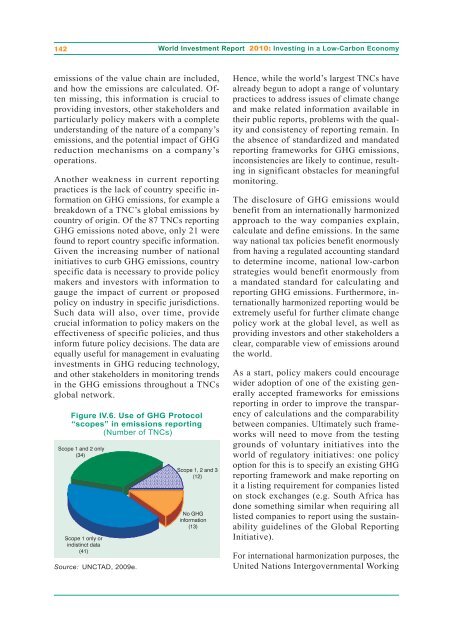UN World Investment Report 2010 - Office of Trade Negotiations
UN World Investment Report 2010 - Office of Trade Negotiations
UN World Investment Report 2010 - Office of Trade Negotiations
Create successful ePaper yourself
Turn your PDF publications into a flip-book with our unique Google optimized e-Paper software.
142<br />
emissions <strong>of</strong> the value chain are included,<br />
and how the emissions are calculated. Often<br />
missing, this information is crucial to<br />
providing investors, other stakeholders and<br />
particularly policy makers with a complete<br />
understanding <strong>of</strong> the nature <strong>of</strong> a company’s<br />
emissions, and the potential impact <strong>of</strong> GHG<br />
reduction mechanisms on a company’s<br />
operations.<br />
Another weakness in current reporting<br />
practices is the lack <strong>of</strong> country specific information<br />
on GHG emissions, for example a<br />
breakdown <strong>of</strong> a TNC’s global emissions by<br />
country <strong>of</strong> origin. Of the 87 TNCs reporting<br />
GHG emissions noted above, only 21 were<br />
found to report country specific information.<br />
Given the increasing number <strong>of</strong> national<br />
initiatives to curb GHG emissions, country<br />
specific data is necessary to provide policy<br />
makers and investors with information to<br />
gauge the impact <strong>of</strong> current or proposed<br />
policy on industry in specific jurisdictions.<br />
Such data will also, over time, provide<br />
crucial information to policy makers on the<br />
effectiveness <strong>of</strong> specific policies, and thus<br />
inform future policy decisions. The data are<br />
equally useful for management in evaluating<br />
investments in GHG reducing technology,<br />
and other stakeholders in monitoring trends<br />
in the GHG emissions throughout a TNCs<br />
global network.<br />
Figure IV.6. Use <strong>of</strong> GHG Protocol<br />
“scopes” in emissions reporting<br />
(Number <strong>of</strong> TNCs)<br />
Scope 1and 2only<br />
(34)<br />
Scope 1only or<br />
indistinct data<br />
(41)<br />
Source: <strong>UN</strong>CTAD, 2009e.<br />
<strong>World</strong> <strong>Investment</strong> <strong>Report</strong> <strong>2010</strong>: Investing in a Low-Carbon Economy<br />
Scope 1, 2and 3<br />
(12)<br />
No GHG<br />
information<br />
(13)<br />
Hence, while the world’s largest TNCs have<br />
already begun to adopt a range <strong>of</strong> voluntary<br />
practices to address issues <strong>of</strong> climate change<br />
and make related information available in<br />
their public reports, problems with the quality<br />
and consistency <strong>of</strong> reporting remain. In<br />
the absence <strong>of</strong> standardized and mandated<br />
reporting frameworks for GHG emissions,<br />
inconsistencies are likely to continue, resulting<br />
in significant obstacles for meaningful<br />
monitoring.<br />
The disclosure <strong>of</strong> GHG emissions would<br />
benefit from an internationally harmonized<br />
approach to the way companies explain,<br />
calculate and define emissions. In the same<br />
way national tax policies benefit enormously<br />
from having a regulated accounting standard<br />
to determine income, national low-carbon<br />
strategies would benefit enormously from<br />
a mandated standard for calculating and<br />
reporting GHG emissions. Furthermore, internationally<br />
harmonized reporting would be<br />
extremely useful for further climate change<br />
policy work at the global level, as well as<br />
providing investors and other stakeholders a<br />
clear, comparable view <strong>of</strong> emissions around<br />
the world.<br />
As a start, policy makers could encourage<br />
wider adoption <strong>of</strong> one <strong>of</strong> the existing generally<br />
accepted frameworks for emissions<br />
reporting in order to improve the transparency<br />
<strong>of</strong> calculations and the comparability<br />
between companies. Ultimately such frameworks<br />
will need to move from the testing<br />
grounds <strong>of</strong> voluntary initiatives into the<br />
world <strong>of</strong> regulatory initiatives: one policy<br />
option for this is to specify an existing GHG<br />
reporting framework and make reporting on<br />
it a listing requirement for companies listed<br />
on stock exchanges (e.g. South Africa has<br />
done something similar when requiring all<br />
listed companies to report using the sustainability<br />
guidelines <strong>of</strong> the Global <strong>Report</strong>ing<br />
Initiative).<br />
For international harmonization purposes, the<br />
United Nations Intergovernmental Working

















